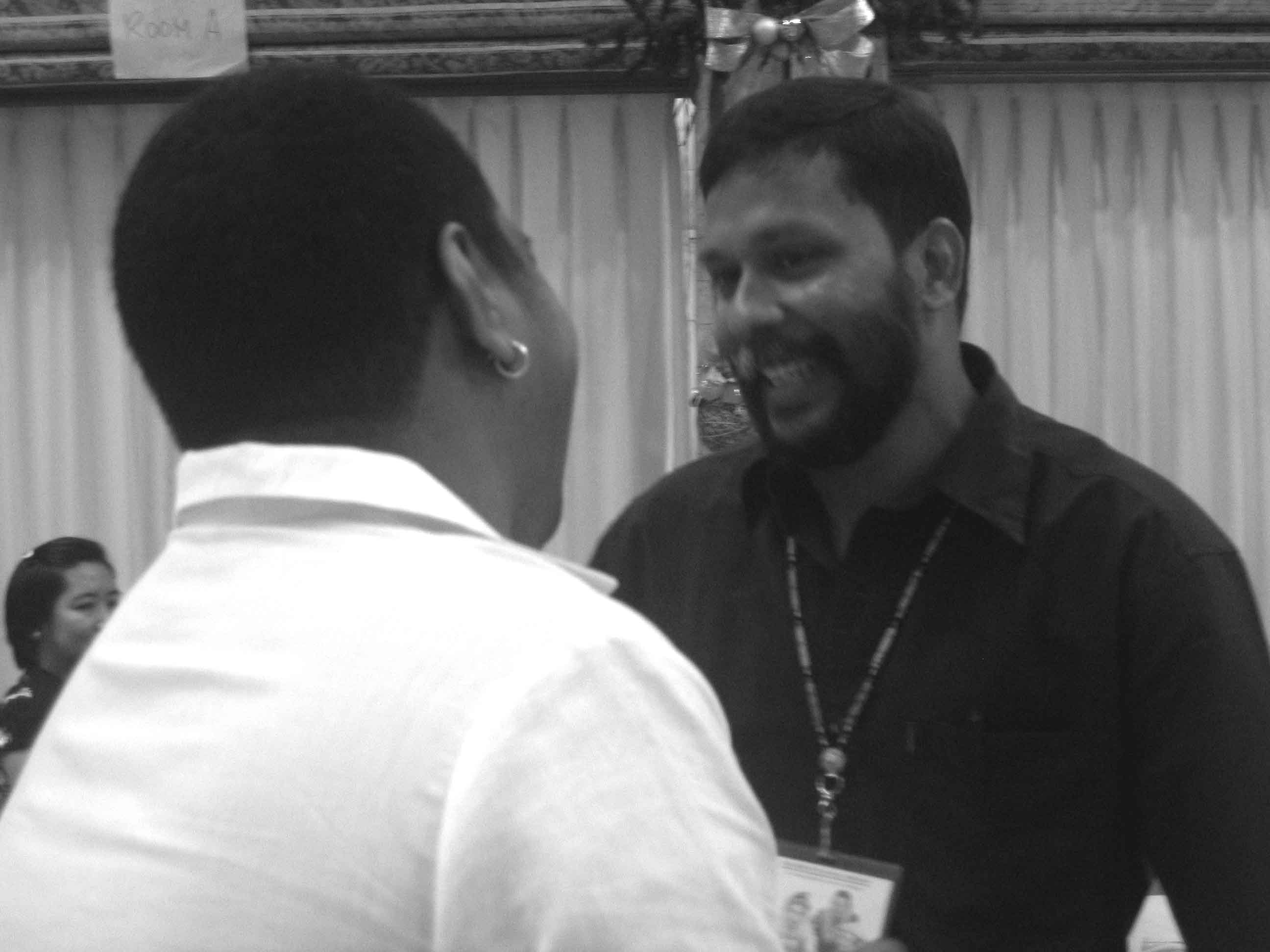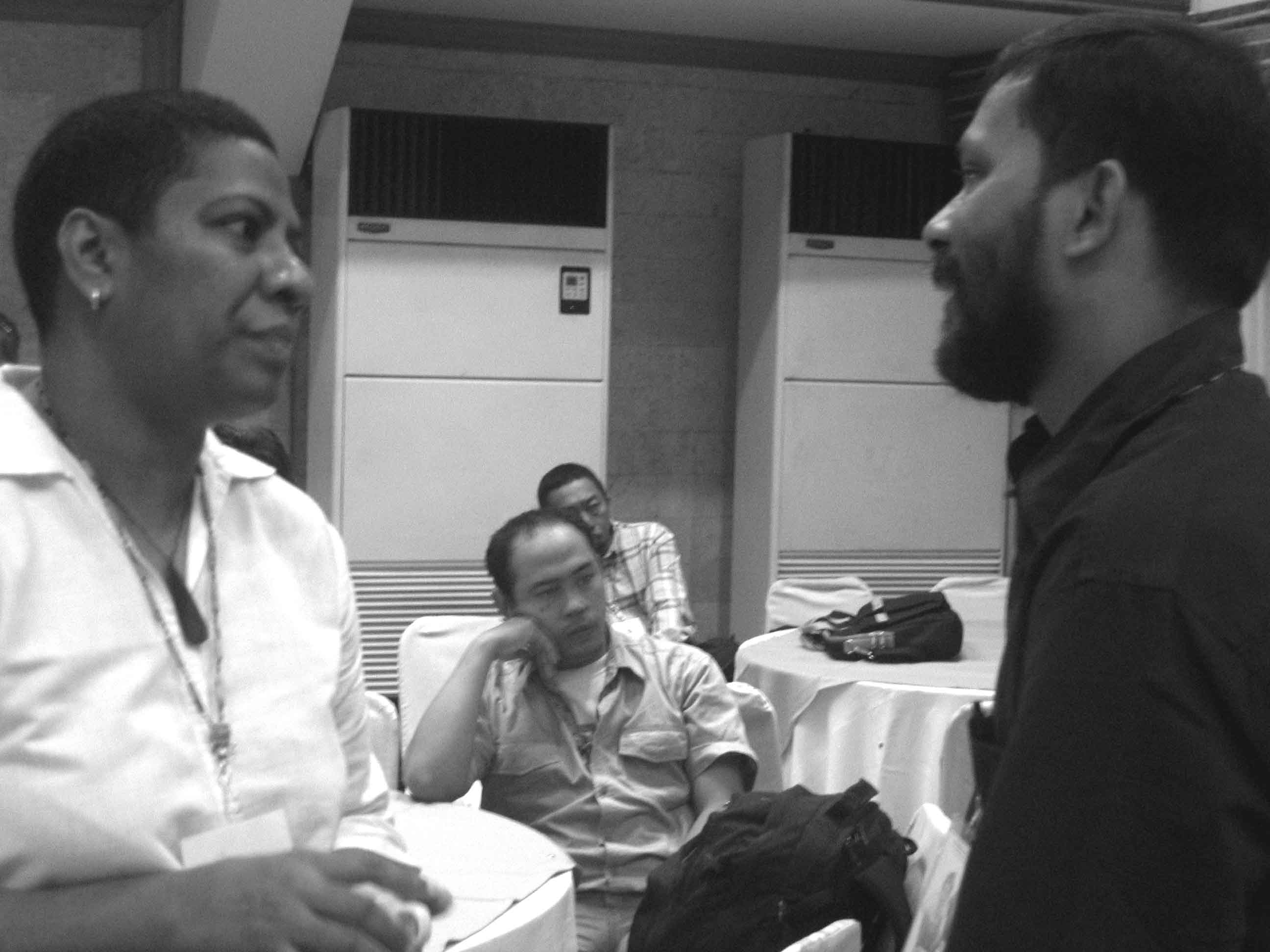William Gois speaks on Asian films and ASEAN feats
WIA had the chance to chat with William Gois, Migrant Forum in Asia’s regional coordinator, as he shared his thoughts on the Asian Freedom Film Festival and ASEAN, in general.
Why did you organise this film festival?
Our target audience was civil society. We organised this festival in the hope of alliance building, coalition building, networking. The other targeted audience would have been people from other ASEAN governments, because we were assuming that ministers would have staff coming to the summit. And even if the high-level people could not come, at least some others would try to make it and just see what things are happening in town. We had thought to have an outreach program to them to say “Come and visit!” That’s why invitations were sent even to the secretaries’ offices.
Since the ASEAN was postponed to January 2007, will you screen the films again?
No, it requires a lot of resources. It was difficult for us to make the decision of pushing through, the reason being that at one stage, the University of the Philippines theater asked us to postpone it for security reasons, but we got one of the local groups to negotiate for us. Looking at all the work expense that has been put into it, postponing it doesn’t make sense. So we had to guarantee security, that we knew the crowd that was going to come, and that we had to take responsibility for the people coming there, in terms of chaperoning, manning the security desk, etc.
Did you get the kind of movies that you wanted?
Oh, more than we had hoped. There were certain synergies that came out that we did not plan for and did not take into account as happening. One was the synergy on the whole Burmese issue. The films about the Burmese migrant workers and the links between forced migration and labour migration, migration in situations of conlict and war and how families and women are affected, that was very good. But what we didn’t account for is that a lot of the people working on Burmese issues would be present as well.
Somebody working on Burmese issues as a political issue actually came to us to thank us for bringing out the issue of Burma, because while we were bringing out a migration issue, the link was established among the viewers and the civil society actors. It’s like we exchanged lenses, you know, which I thought was interesting. Of course one of the things that concerns us is how people will use the movies for training and organising. It is one powerful way of getting the message across. But there are limitations on how we are able to use it. Definitely there is the possibility now of taking this to the World Social Forum (WSF) where we were invited to bring up cultural and other forms of action. The WSF is looking for poetry, and films, and posters and stuff, we thought we’d take it there.
Do you see migrants themselves in the future producing films from their experience?
 A number of films are in some ways produced by the migrants themselves, in the sense that they have been very involved in it. Like the film by Amardeep [Kaur Gill]. It started because she accompanied the Indonesian migrants during the Hong Kong mobilisation against the World Trade Organisation (WTO) in December 2005. So as a young producer she was touched or impressed by the sight of these domestic workers mobilising for their rights. So she started journeying with them.
A number of films are in some ways produced by the migrants themselves, in the sense that they have been very involved in it. Like the film by Amardeep [Kaur Gill]. It started because she accompanied the Indonesian migrants during the Hong Kong mobilisation against the World Trade Organisation (WTO) in December 2005. So as a young producer she was touched or impressed by the sight of these domestic workers mobilising for their rights. So she started journeying with them.
She may be thinking of another film on migration, but her idea is to continue working with the Indonesian domestic workers in Hong Kong. So definitely this is a medium migrant workers are exploring more and more. And we, at the Migrant Forum in Asia (MFA), have a number of roles to play in terms of defining/producing the script and in terms of seeing how migrant workers will be projected.
Gois’ thoughts on regionalism, democracy and citizenship
 I think the film festival and our participation in the ASEAN Civil Society Conference (ACSC) became important because last year the ASEAN ministers decided to elaborate on an instrument for the protection of migrant workers in the ASEAN region. That provoked a lot of interest in what kind of instrument they were going to come up with. This is a region where you have serious migrant worker issues. You have the Mekong region where you have Thailand as a receiving country, and Laos, Cambodia, and Vietnam as sending countries. But at the same time you have Cambodia as a receiving country because it gets Vietnamese women. So that is one bloc. Then you have one bloc that is Malaysia, Indonesia, Singapore, and the Philippines, where you have Malaysia and Singapore as receiving countries and the Philippines and Indonesia as sending countries. Then you have the complexity of Malaysia and the Philippines, having traditional flows of people between them.
I think the film festival and our participation in the ASEAN Civil Society Conference (ACSC) became important because last year the ASEAN ministers decided to elaborate on an instrument for the protection of migrant workers in the ASEAN region. That provoked a lot of interest in what kind of instrument they were going to come up with. This is a region where you have serious migrant worker issues. You have the Mekong region where you have Thailand as a receiving country, and Laos, Cambodia, and Vietnam as sending countries. But at the same time you have Cambodia as a receiving country because it gets Vietnamese women. So that is one bloc. Then you have one bloc that is Malaysia, Indonesia, Singapore, and the Philippines, where you have Malaysia and Singapore as receiving countries and the Philippines and Indonesia as sending countries. Then you have the complexity of Malaysia and the Philippines, having traditional flows of people between them.
The migration issues in the ASEAN region are complex. That is why we were surprised that the ASEAN ministers would think of elaborating an instrument to protect the rights of migrant workers, when at the same time we have more than half a million undocumented workers in this region. If you take into account undocumented workers in Thailand and Malaysia, you have almost half a million undocumented workers! How do you account for that? In that sense, talk of regionalism, especially when the ASEAN talks of community and things like that, should include the question: what kind of framework do you elaborate on that will reflect the true state of migration, or a true understanding of the issues, and build a greater sense of community.
I think it is a challenge to review the notion of citizenship. The current notion is tied to state and boundaries and nationhood. When we see that economically (through trade barriers, etc.), national boundaries are being brought down and you see migrants or migrant workers crossing borders, and even the very cycles of migration, (when workers keep renewing their contracts), there are serious issues in terms of how citizenship will be defined. Because you have issues of stateless children, you have issues of people taking up residence but having to contend with their nationalities of origin, etc. A lot of this is changing. So citizenship cannot be defined anymore within the parameters in which it was earlier defined.
The rights and social justice discourse is something that will come to bear on the redefinition of citizenship. As more and more countries grapple with the phenomenon of migration, trying to understand what are the rights of migrant workers, trying to understand what are the rights of undocumented workers, more and more we will see that the space for citizenship will broaden in terms of participation. Migrant communities will demand citizenship rights or the pressure will intensify so much that the space will have to be given to migrant workers to participate in state governance. Like Singapore for example, where you have a large percentage of migrant workers, to some extent these migrant workers will have to be taken into consideration. They have to be involved and participate in deciding Singapore’s laws, policies, and governance. It’s the same with Thailand — which depends on a large influx of migrant workers. The more the migrant worker is recognised, not just as a service provider or as a commodity to be traded, the more we see the human face, the more we will be transforming the traditional definition of and redefining citizenship in terms of the right to participate.
There are some countries that allow migrant workers to participate in local government elections, yes that is happening already. That is a model that can be explored. But I think in the ASEAN there is still a long way to go. I think it is something that will be taken up in other regions from a security perspective, at least to safeguard ourselves from what we saw last year in Europe, in France for example, where migrant communities were getting restless and expressing their frustration. So I think the rights of migrant workers, the recognition of their human face — the more this is out there, the more this is talked about, the more it is accepted as a global phenomenon, the more these kinds of spaces will be explored with tremendous possibilities.





 The
The 
 Isis Resource Center holds one of the largest feminist collections of materials in the Global South. With 40 years of publication experience, Isis holds a vast collection.
Isis Resource Center holds one of the largest feminist collections of materials in the Global South. With 40 years of publication experience, Isis holds a vast collection.